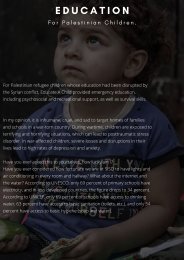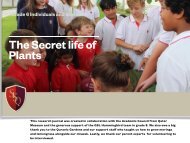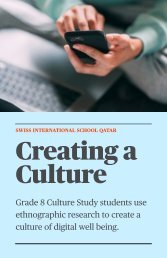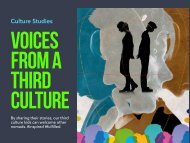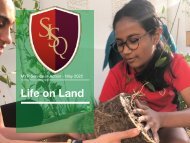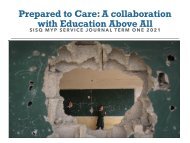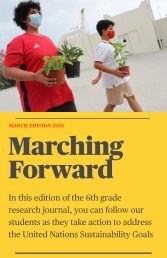How can we support children in conflict areas?
This magazine is written by young people to encourage other young people to join "Education Above All" to ensure that ALL children can get a quality education.
This magazine is written by young people to encourage other young people to join "Education Above All" to ensure that ALL children can get a quality education.
Create successful ePaper yourself
Turn your PDF publications into a flip-book with our unique Google optimized e-Paper software.
2023 SISQ Service as Action<br />
Education<br />
Above All: how<br />
do <strong>we</strong> help<br />
<strong>children</strong> <strong>in</strong><br />
<strong>conflict</strong> zones?<br />
Sara, a Syrian refugee <strong>in</strong> Jordan, helps to prepare her baby brother to<br />
prepare for school. This magaz<strong>in</strong>e explores what <strong>we</strong> <strong>can</strong> do to help her.
Human Strength<br />
(from Syria and Palest<strong>in</strong>e)<br />
Sara is one of 10.4 million refugees <strong>in</strong><br />
Jordan who are receiv<strong>in</strong>g an education<br />
due to the <strong>support</strong> of “Education Above<br />
All”. The Al Fakhoora project provides<br />
hope young survivors like her.<br />
THERE ARE CURRENTLY 64 MILLION<br />
CHILDREN WHO CANNOT ACCESS<br />
PRIMARY EDUCATION. IN 2022, SISQ<br />
STUDENTS PARTNERED WITH<br />
“EDUCATION ABOVE ALL” TO HELP<br />
THEM REACH 16 MILLION CHILDREN.<br />
THIS YEAR, WE ARE INSPIRED AND<br />
PREPARED TO HELP EVEN MORE<br />
CHILDREN AND WE ARE<br />
ENCOURAGING OTHERS TO JOIN US.
The Po<strong>we</strong>r of Love<br />
In 2008, Ahmed Al Sawaferi was just a<br />
child when he lost 3 of his 4 limbs <strong>in</strong> a<br />
bomb strike. Today, he is a teacher<br />
who <strong>in</strong>spires young people across the<br />
world.<br />
We say that a picture is worth a thousand words.<br />
This photo speaks volumes. <br />
Every day, our students enjoy air condition<strong>in</strong>g <strong>in</strong><br />
<strong>we</strong>ll resourced classrooms. We enjoy the f<strong>in</strong>est<br />
technology and <strong>we</strong>ll decorated rooms.<br />
Every day, students <strong>in</strong> <strong>conflict</strong> zones experience<br />
po<strong>we</strong>r cuts, over crowd<strong>in</strong>g and a lack of resources.<br />
Despite this, the message is clear: these students<br />
want to learn. Their teachers want to teach.<br />
Knowledge is a po<strong>we</strong>r that no enemy <strong>can</strong> ever take<br />
away from you.
The Al Fakhoora Project changes lives!<br />
When Dalia Maalouf from the Al Fakhoora project<br />
came to speak to our grade 8 students, <strong>we</strong> <strong>we</strong>re<br />
blown away by the impact of this project.<br />
Gaza is one of the most densely populated places<br />
on Earth with over 60% of people rely<strong>in</strong>g on aid.<br />
Only 5% of water is dr<strong>in</strong>kable. Gaza has been<br />
called the world’s biggest “open air prison” and it<br />
is not surpris<strong>in</strong>g that youth unemployment is 56%<br />
- one of the highest <strong>in</strong> the world.<br />
Despite these obstacles, Al Fakhoora provides<br />
scholarships for these young leaders to become<br />
civic leaders and rebuild their communities.<br />
Not only do they receive emotional and f<strong>in</strong>ancial<br />
<strong>support</strong>, they also receive leadership tra<strong>in</strong><strong>in</strong>g and<br />
they create projects to rebuild their homes<br />
“You give but little when you give of your<br />
possessions. It is when you give of yourself<br />
that you truly give” Khalil Gibran
The Al Fakhoora project does more than just pay education<br />
bills. It moulds young leaders to rebuild their societies and<br />
create harmony and stability.
Help<strong>in</strong>g others helps us!<br />
In today’s modern world, do <strong>we</strong><br />
even need to read? <br />
The simple ans<strong>we</strong>r is yes. A child who reads<br />
for less than 2 m<strong>in</strong>utes a day is exposed to<br />
8000 words a year and will score at the<br />
bottom 10% <strong>in</strong> grade 6. A child who reads for<br />
20 m<strong>in</strong>utes, will be exposed to 1,800 000<br />
words and be <strong>in</strong> the top 10%.<br />
<strong>How</strong> do <strong>we</strong> get our <strong>children</strong> to love<br />
read<strong>in</strong>g? <br />
We read with them. We read to them. We<br />
read <strong>in</strong> front of them. It’s called DEAR or<br />
“ Drop Everyth<strong>in</strong>g AND READ”. <br />
Families read<strong>in</strong>g together at the DEAR picnic<br />
Our<br />
PYP students <strong>in</strong>vited their moms and dads<br />
to a DEAR picnic and some of our DP CAS<br />
students decided to jo<strong>in</strong> them and read the<br />
books that they had loved at their age.<br />
In MYP, students participated <strong>in</strong> a<br />
sponsored readathon and raised over<br />
1000qr.<br />
Students that read the most, sho<strong>we</strong>d<br />
marked improvement academically. By<br />
help<strong>in</strong>g others, <strong>we</strong> helped ourselves!
Gam<strong>in</strong>g for The Goals.<br />
We have just seen how resilient the<br />
young people <strong>in</strong> Al Fakhoora are and<br />
<strong>we</strong> have seen how young Syrians<br />
<strong>support</strong> each other to learn but what<br />
about young people <strong>in</strong> Doha?<br />
When EAA organized a national<br />
football match, our lads stepped up<br />
and raised 100000qr to f<strong>in</strong>ance<br />
poorer students.<br />
The amaz<strong>in</strong>g team at EAA found<br />
sponsors for our teams and <strong>we</strong> thank<br />
Qatar Insurance Company and<br />
Marriot for their generous <strong>support</strong>.<br />
This year, <strong>we</strong> look forward to<br />
encourag<strong>in</strong>g our girls to participate.
Education <strong>in</strong> India -<br />
Keziah<br />
I hate it’<br />
Said Rahul, an 11 year old boy<br />
praised by his teachers for be<strong>in</strong>g a<br />
bright child. But <strong>in</strong>stead of go<strong>in</strong>g to<br />
school, young Rahul had to go to<br />
work, as the schools <strong>in</strong> India. <strong>we</strong>re<br />
closed due to the pandemic,<br />
Every morn<strong>in</strong>g, <strong>in</strong> the outskirts of the city Tumukaru,<br />
groups of <strong>children</strong> <strong>we</strong>re on the street. Rather than<br />
hold<strong>in</strong>g a backpack, each child held a filthy plastic sack.<br />
These <strong>children</strong>, aged 6-14 years old, <strong>we</strong>re sent there to<br />
collect potentially recyclable materials such as plastic<br />
<strong>in</strong> the middle of glass and cement shards. With no<br />
protection. Some <strong>we</strong>re even barefoot which led to<br />
bleed<strong>in</strong>g feet. For this work, they got about a few cents<br />
per hour, which barely helped their family survive.<br />
In many parts of the develop<strong>in</strong>g world, school closures<br />
put <strong>children</strong> on the streets. Families <strong>we</strong>re desperate<br />
for money. Children <strong>we</strong>re an easy source of cheap<br />
labour.
S<strong>in</strong>ce the constitution of India <strong>in</strong> 1950 was implemented,<br />
education has become a signifi<strong>can</strong>t and important aspect<br />
of life <strong>in</strong> India. There is currently an estimated 6.1 million<br />
<strong>children</strong> out of school <strong>in</strong> 2014 reduced from 13.46 million <strong>in</strong><br />
2006. Although this was enforced years ago, India’s<br />
education system still faces struggles. This is ma<strong>in</strong>ly due<br />
to the high school dropout rate, gender <strong>in</strong>equalities and<br />
poverty.<br />
Out of 100 students, 29 percent of girls and boys drop out<br />
of school before complet<strong>in</strong>g the full cycle of elementary<br />
education, and often they are the most marg<strong>in</strong>alised<br />
<strong>children</strong>. There is <strong>in</strong>adequate fund<strong>in</strong>g for education, it’s<br />
quite lo<strong>we</strong>r than most developed and OECD countries.<br />
There is a lack of facilities as <strong>we</strong>ll, like no proper access to<br />
dr<strong>in</strong>k<strong>in</strong>g water, functional toilets and no separate toilets<br />
for girls. Around 1.2 million schools are function<strong>in</strong>g with<br />
less than 50 students.<br />
The lack of resources is high as <strong>we</strong>ll as the ratio of<br />
teachers to students. They have many classes with<br />
over 40-50 students with only 1 teacher. This limits<br />
the amount of time the teachers <strong>can</strong> spend on<br />
struggl<strong>in</strong>g students, especially when only 50% of<br />
Grade 5 students <strong>can</strong> barely read Grade 2 texts.<br />
As always there is a solution to every challenge or problem.<br />
Education Above All is work<strong>in</strong>g with the Bharti Foundation<br />
and Educate Girls. These two foundations focus on send<strong>in</strong>g<br />
<strong>children</strong> to or back to school, the latter primarily focus<strong>in</strong>g<br />
on girls.<br />
The Bharti Foundation along with EAA was<br />
established <strong>in</strong> 2000 with the vision of help<strong>in</strong>g<br />
underprivileged <strong>children</strong> <strong>in</strong> India realise their<br />
potential. The Foundation’s current focus is to<br />
bridge the education divide by br<strong>in</strong>g<strong>in</strong>g about<br />
programmes <strong>in</strong> rural India that promote quality<br />
education. This program reaches out to<br />
thousands of underprivileged and<br />
marg<strong>in</strong>alised <strong>children</strong>. Currently, more than<br />
38,000 students are enrolled across 253<br />
Satya Bharti Schools <strong>in</strong> the states of Punjab,<br />
Haryana, Rajasthan, Uttar Pradesh, Tamil<br />
Nadu, and West Bengal all <strong>in</strong> India.<br />
Another organisation that EAA is <strong>in</strong> partnership with is<br />
Educate Girls. It is a non-governmental organisation that<br />
deals with the issues of gender <strong>in</strong>equality <strong>in</strong> India’s<br />
education system. Educate Girls has grown from a 500-<br />
school pilot project <strong>in</strong> Rajasthan to now serv<strong>in</strong>g over<br />
21,000 schools spread across 15 districts <strong>in</strong> Rajasthan and<br />
Madhya Pradesh. The organisation encourages girl<br />
students, teachers, school and communities to create a<br />
susta<strong>in</strong>able, holistic platform <strong>in</strong> each village. They aim to<br />
secure higher attendance, 100% enrolment and improved<br />
learn<strong>in</strong>g outcomes.
EAA along with this organisation, foundation and many<br />
more partnerships, move towards a future where<br />
quality education is available throughout India, where<br />
gender discrim<strong>in</strong>ation doesn’t stop the other gender<br />
from com<strong>in</strong>g to school and <strong>in</strong>stead they get married<br />
as young adelosents or where <strong>children</strong> don’t have to<br />
work to provide for their family, where education is<br />
affordable and every s<strong>in</strong>gle child has the right as <strong>we</strong>ll<br />
as the opportunity to education.<br />
Rahul now studies <strong>in</strong> a school where there<br />
is proper, quality education. He goes to<br />
school with a backpack strapped to his<br />
shoulders, shoes on his feet and <strong>we</strong>ars his<br />
school uniform. He skips hand <strong>in</strong> hand with<br />
his new friends to class. His smile has never<br />
been brighter. No more glass shards, or<br />
dirty garbage or bare footedness.<br />
Everyone, especially <strong>children</strong> deserve the<br />
right to education...<br />
The opportunity to learn
Bibliography<br />
“As Covid-19 Closes Schools, the World’s Children Go to Work (Published 2020).” The New York Times, 2022,<br />
www.nytimes.com/2020/09/27/world/asia/covid-19-<strong>in</strong>dia-<strong>children</strong>-school-educatio n-labor.html. Accessed 15 Sept. 2022.<br />
“Bharti Foundation | Education above All Foundation.” Educationaboveall.org, 2022, educationaboveall.org/our-partners/<br />
bharti-foundation. Accessed 15 Sept. 2022.<br />
“Educate Girls | Education above All Foundation.” Educationaboveall.org, 2022, educationaboveall.org/our-partners/<br />
educate-girls. Accessed 15 Sept. 2022. Gaurav STC. “Save the Children.” Save the Children, 6 Oct. 2017,<br />
www.savethe<strong>children</strong>.<strong>in</strong>/child-protection/five-major-challenges-for-<strong>children</strong>-from- marg<strong>in</strong>alised-<strong>in</strong>dian-communities/.<br />
Accessed 15 Sept. 2022.
A Look at Syria - Madelyn<br />
I’m Aras. I'm only 11 years old and I have to help my<br />
parents earn money. I go to a tailor shop so I <strong>can</strong> help my<br />
family pay the bills for electricity, hot water, and more.<br />
This work takes 12 hours a day from Monday to Friday.<br />
Despite this, the hard work that I endure, only earns me<br />
50 cents an hour. <strong>How</strong>ever, most <strong>children</strong> <strong>in</strong> Syria do not<br />
work like me, they are sent out <strong>in</strong>to the streets to beg.<br />
Luckily, I'm allo<strong>we</strong>d to go to school on the <strong>we</strong>ekend. I’m<br />
learn<strong>in</strong>g Arabic, and math, and I love school because I<br />
don’t have to hear the loud noises. Why do I have to go<br />
through this? These horrible th<strong>in</strong>gs I must see and hear<br />
Day and Night.<br />
On March 15, 2011, the Syrian War began. This war<br />
threatened the stability of communities and the<br />
development of Syria. Because of this, <strong>children</strong> are forced<br />
to help their parents earn money. The cause of this war<br />
<strong>we</strong>re the protests that began as a result of <strong>conflict</strong><br />
aga<strong>in</strong>st the Syrian government. These protests then<br />
turned violent when suppressed. In the midst of this<br />
<strong>conflict</strong>, <strong>children</strong> are forced to lose their education.<br />
gett<strong>in</strong>g married as m<strong>in</strong>ors. But the problems could be<br />
solved. The International Society has already tried to<br />
solve these problems. Still, little has improved.<br />
Fortunately, there is still an opportunity to improve this<br />
situation. For example, <strong>in</strong>stead of send<strong>in</strong>g money,<br />
different resources <strong>can</strong> be sent to help the refugees.<br />
Volunteers are an impactful resource as certified doctors<br />
and teachers are required the most.<br />
'Education Above All' is a foundation established <strong>in</strong> 2009.<br />
The ma<strong>in</strong> purpose of this organization is to provide an<br />
education to the students who lost their schools due to<br />
the events <strong>in</strong> Gaza. To do this, many projects are tak<strong>in</strong>g<br />
place, such as provid<strong>in</strong>g medical help, build<strong>in</strong>g schools,<br />
provid<strong>in</strong>g psychosocial <strong>support</strong>, and provid<strong>in</strong>g vocational<br />
help for students with disabilities that <strong>we</strong>re started by Al-<br />
Fakhoora. These projects have been very successful<br />
andhave allo<strong>we</strong>d Al-Fakhoora to turn <strong>in</strong>to an education<br />
<strong>support</strong> system with<strong>in</strong> Gaza with 102 educational<br />
<strong>in</strong>stitutes be<strong>in</strong>g rebuilt and ma<strong>in</strong>ta<strong>in</strong>ed. The International<br />
Society has also spoken of $1.4 billion to give as aid to the<br />
people.<br />
Education is very important for m<strong>in</strong>dfulness and<br />
protection and with this money, the <strong>children</strong> could have a<br />
chance at education. Education also gives the <strong>children</strong> a<br />
chance to improve their future <strong>in</strong>stead of work<strong>in</strong>g and
If groups are sent out, the teachers have to take part <strong>in</strong> teacher tra<strong>in</strong><strong>in</strong>g so that the <strong>children</strong> receive a quality education. These<br />
projects sometimes last 3-5 years and are very expensive. They require big commitment. Nonetheless, the organization has<br />
achieved many successes, with more than 11 million refugee <strong>children</strong> enrolled <strong>in</strong> school. There are still millions of <strong>children</strong> <strong>in</strong> the<br />
world who do not get this opportunity.<br />
Children, like Aras.
The German Version<br />
Thank you, Madelyn, for translat<strong>in</strong>g.<br />
Am 15. März 2011 begann der Syrische Krieg. Dieser Krieg hat die Stabilität von Geme<strong>in</strong>schaften und die Entwicklung Syriens<br />
bedroht. Aus diesem Grund <strong>we</strong>rden K<strong>in</strong>der gezwungen, ihren Eltern beim Geldverdienen zu helfen. Die Ursache dieses Krieges<br />
waren die Proteste, dass als Folge von verschiedenen Me<strong>in</strong>ungen gegen die syrische Regierung begannen. Diese Proteste<br />
wurden dann gewalttätig, als sie unterdrückt wurden.<br />
Die Proteste bestanden aus Menschen, die wollten, dass der syrische Präsident Bashar al-Assad von se<strong>in</strong>em Amt als<br />
Präsident entfernt wird. Schließlich löste sich e<strong>in</strong> großer Konflikt aus, der zu e<strong>in</strong>er Gefahr für die Geme<strong>in</strong>den <strong>in</strong> Syrien führte.<br />
Der aktuelle Kriegszustand ist immer noch aktiv, da der Krieg mit dem Beitrag e<strong>in</strong>er <strong>in</strong>ternationalen Verb<strong>in</strong>dung geführt wird.<br />
Dies hat Syrien zu e<strong>in</strong>em gefährlichen Konfliktgebiet gemacht, und dies zwang Zehntausende zur Evakuierung.<br />
Die Folgen des Krieges waren der Tod und die Zerstörung, die <strong>in</strong> Konfliktgebieten noch immer vorhanden s<strong>in</strong>d. Durch diese<br />
Störung g<strong>in</strong>g auch die Chance auf Bildung für K<strong>in</strong>der verloren. Glücklicher<strong>we</strong>ise ist e<strong>in</strong>e Wohltätigkeitsorganisation dabei, den<br />
Menschen <strong>in</strong> Syrien zu helfen, durch e<strong>in</strong>e bessere Zukunft zu erlauben.<br />
Was ist eigentlich die Wohltätigkeitsorganisation ‘Bildung vor allem’? ‘Bildung vor allem’ ist e<strong>in</strong>e Stiftung, die 2009 gegründet<br />
wurde. Der Hauptz<strong>we</strong>ck dieser Organisation ist den Schülern, die aufgrund der Ereignisse <strong>in</strong> Gaza ihre Schule verloren haben,<br />
e<strong>in</strong>e Ausbildung zu ermöglichen. Viele Projekte f<strong>in</strong>den beispiels<strong>we</strong>ise auch statt, Projekte wie die Versorgung mediz<strong>in</strong>ischer<br />
Hilfe, der Aufbau von Schulen, die Versorgung psychosozialer Unterstützung, und die Versorgung von Berufshilfe für Schüler<br />
mit Beh<strong>in</strong>derungen, die von Al-Fakhoora gestartet wurden. Diese Projekte waren sehr hilfreich und machten Al-Fakhoora zu<br />
e<strong>in</strong>em Unterstützungssystem für die Bildung <strong>in</strong> Gaza mit 102 Bildungs<strong>in</strong>situten, die wieder aufgebaut und unterhalten <strong>we</strong>rden.<br />
Die Internationale Gesellschaft hat auch von 1,4 Milliarden Dollar gesprochen, um den Menschen Hilfe zu geben. Trotzdem<br />
wurden nicht e<strong>in</strong>mal 400 Millionen Dollar geschickt. Aus diesem Grund kann die Flüchtl<strong>in</strong>gssituation nicht verbessert <strong>we</strong>rden.
Bildung ist sehr wichtig für Wissen und Schutz und mit<br />
diesem Geld könnten die K<strong>in</strong>der e<strong>in</strong>e Chance auf Bildung<br />
haben. Durch Bildung haben die K<strong>in</strong>der auch e<strong>in</strong>e Chance,<br />
ihre Zukunft zu verbessern, anstatt zu früh zu arbeiten<br />
und zu heiraten. Die Probleme könnten aber gelöst<br />
<strong>we</strong>rden. Die Internationale Gesellschaft hat diese<br />
Probleme zu lösen schon versucht. Trotzdem wird <strong>we</strong>nig<br />
verbessert. Glücklicher<strong>we</strong>ise besteht noch die Möglichkeit,<br />
diese Situation zu verbessern.<br />
ZumBeispiel,anstattGeldzuschicken,könnenverschiedeneR<br />
essourcengruppen geschickt <strong>we</strong>rden, um den Flüchtl<strong>in</strong>gen<br />
zu helfen. Von diesen Gruppen könnten Menschen für<br />
verschiedene Aufgaben wie Bau, mediz<strong>in</strong>ische Hilfe und<br />
Unterricht für die K<strong>in</strong>der verantwortlich se<strong>in</strong>. Dies würde<br />
den Wiederaufbau Prozess beschleunigen.<br />
Wenn Gruppen verschickt <strong>we</strong>rden, müssen die Lehrkräfte<br />
an der Lehrerfortbildung teilnehmen, damit die K<strong>in</strong>der <strong>in</strong><br />
e<strong>in</strong>em guten Qualität lernen. damit die K<strong>in</strong>der e<strong>in</strong>e<br />
qualitative Bildung erhalten. Diese Projekte dauern<br />
manchmal 3-5 Jahre und s<strong>in</strong>d sehr teuer. Des<strong>we</strong>gen ist es<br />
e<strong>in</strong>e große Verpflichtung. Dennoch hat die Organisation<br />
viele Erfolge erreicht, mit mehr als 11 Millionen<br />
Flüchtl<strong>in</strong>gsk<strong>in</strong>dern <strong>in</strong> der Schule e<strong>in</strong>geschrieben. Immer<br />
noch gibt es Millionen K<strong>in</strong>der auf der Welt, die ke<strong>in</strong>e Hilfe<br />
kriegen. Ihr Hauptziel s<strong>in</strong>d 0 K<strong>in</strong>der haben, die nicht <strong>in</strong> der<br />
Schule s<strong>in</strong>d.<br />
E<strong>in</strong> Beispiel von e<strong>in</strong>em Flüchtl<strong>in</strong>gsk<strong>in</strong>d ist das Leben von<br />
Aras. Die Aras ist nur 11 Jahre alt und muss ihren Eltern<br />
beim Geldverdienen helfen. Sie muss <strong>in</strong> e<strong>in</strong>er<br />
Schneider<strong>we</strong>rkstatt arbeiten, damit sie ihrer Familie helfen<br />
kann, um die Rechnungen für Strom, Warmwasser und<br />
mehr zu bezahlen. Diese Arbeit dauert 12 Stunden pro Tag<br />
von Montag bis Freitag <strong>in</strong> der Schneider<strong>we</strong>rkstatt.<br />
Trotzdembr<strong>in</strong>gtdieharteArbeit,diedieK<strong>in</strong>derertragenmüss<br />
en,ihnen50 Cent pro Stunde e<strong>in</strong>. Die meisten K<strong>in</strong>der <strong>in</strong> der<br />
Türkei arbeiten aber nicht wie die Aras, sie <strong>we</strong>rden zum<br />
Betteln auf die Straße geschickt. Glücklicher<strong>we</strong>ise darf die<br />
Aras am Wochenende die Schule besuchen. Sie lernt<br />
Arabisch, Turkisch, und Mathe, und sie f<strong>in</strong>det die Schule<br />
sehr schön, <strong>we</strong>il sie die lauten Geräusche nicht hören<br />
muss.<br />
Zusammenfassend kann man sagen, dass die<br />
Wohltätigkeitsorganisation ‘Bildung vor allem’ und die<br />
Internationale Gesellschaft gute Ergebnisse erzielt. Sie<br />
haben das mit der Versorgung von verschiedener Hilfe, wie<br />
mediz<strong>in</strong>ischer, psychosozialer Unterstützung, dem Aufbau<br />
von Schulen, und so <strong>we</strong>iter. Die Internationale Gesellschaft<br />
hat geholfen <strong>in</strong>dem sie rund 400 Millionen Dollar geschickt<br />
hat. Der Effekt von diesem Geld <strong>in</strong> den<br />
Flüchtl<strong>in</strong>gssituationen s<strong>in</strong>d kle<strong>in</strong>e Verbesserungen.<br />
Des<strong>we</strong>gen ist es unsere Aufgabe als Menschen und<br />
Studenten,
Bewusstse<strong>in</strong> für dieses Thema zu schaffen. Allerd<strong>in</strong>gs, bis die Unstimmigkeiten mit dem syrischen Präsidenten Bashar al-Assad<br />
erledigt s<strong>in</strong>d, <strong>we</strong>rden immer noch Millionen Menschen gefährdet.
The Pa<strong>in</strong> of Child<br />
Labour<br />
Ellemieke, Grace, Jana<br />
One of the issues that deeply affected our<br />
grade 8s was the knowledge that so many<br />
young <strong>children</strong> from poorer communities<br />
are forced <strong>in</strong>to be<strong>in</strong>g child laborers.<br />
This exploitation is especially hard on<br />
<strong>children</strong> <strong>in</strong> <strong>conflict</strong> zones and especially<br />
dangerous for girls.<br />
A child <strong>in</strong> a classroom is one less child <strong>in</strong><br />
danger of be<strong>in</strong>g exploited.<br />
Make a difference by <strong>support</strong><strong>in</strong>g<br />
“ Educate a Child” .
Child Labour (Dutch)<br />
Alejandra<br />
Alejandra, die pas twaalf is, wordt om 4 uur 's<br />
ochtends ge<strong>we</strong>kt door haar vader. Don José. Ze<br />
<strong>we</strong>rkt, ze krijgt geen opleid<strong>in</strong>g. Wat ze <strong>we</strong>l doet, is<br />
curiles verzamelen. Ze verzamelt ze "<strong>in</strong> de<br />
mangrovemoerassen op het eiland Espiritu Santu<br />
<strong>in</strong> Usulutan, EL Salvador."<br />
Alejandra eet geen ontbijt omdat ze haast heeft<br />
om naar haar <strong>we</strong>rk te gaan. Voor haar is het<br />
belangrijker om d<strong>in</strong>gen mee te nemen die ze<br />
"nodig" heeft voor haar <strong>we</strong>rk, wat tot 14 uur <strong>in</strong> de<br />
modder kan duren. Het meest verwoestende is<br />
dat “deze items ongeveer een dozijn sigaren<br />
bevatten, m<strong>in</strong>imaal 4 pillen om haar wakker te<br />
houden. En een groot deel van het geld dat ze<br />
verdient, gaat naar deze items.<br />
Ze verdient heel <strong>we</strong><strong>in</strong>ig.<br />
Als ze geluk heeft, verdient ze iets meer dan 12<br />
colones of $ 1,40. Voor dat geld haalt ze t<strong>we</strong>e<br />
manden curiles (ongeveer 150 schelpen) op voor<br />
Caption<br />
die geluksdag.“ Zij, die ook voor haar zeven<br />
jongere broertjes en zusjes moet zorgen, “heeft<br />
geen tijd om naar school te gaan en kan niet<br />
spelen met k<strong>in</strong>deren.“ Hoe dan ook, ze doet het<br />
liever niet, omdat ze zeggen dat ze st<strong>in</strong>kt en ze<br />
sluiten haar uit van spelletjes, alleen omdat ze een<br />
curiles-<strong>we</strong>rkster is.<br />
“Kle<strong>in</strong> voor <strong>we</strong><strong>in</strong>ig heeft Alejandra het gevoel van<br />
eigenwaarde verloren. Net als de andere k<strong>in</strong>deren<br />
die curiles verzamelen, voelt ze zich afgescheiden<br />
van de rest van de samenlev<strong>in</strong>g. Voor Alejeandra<br />
lijkt het leven een tunnel zonder uitgang.”<br />
( https://www.ilo.org/wcmsp5/groups/public )
48%<br />
Is dat het bedrag dat een bank elk jaar verdient? Of nee, is<br />
dat het aantal mensen dat viert als het zomervakantie is?<br />
48%.<br />
“48% van alle slachtoffers van arbeid is tussen de 5 en 11<br />
jaar oud. Bijna de helft van de slachtoffers van<br />
k<strong>in</strong>derarbeid (73 miljoen) <strong>we</strong>rkt <strong>in</strong> een gevaarlijke <strong>in</strong>richt<strong>in</strong>g<br />
voor k<strong>in</strong>derarbeid; meer dan een kwart van de gevaarlijke<br />
k<strong>in</strong>derarbeid wordt gedaan door k<strong>in</strong>deren jonger dan 12<br />
jaar. (19 miljoen). “<br />
behandel<strong>in</strong>g, waardoor hun fundamentele rechten worden<br />
beperkt en hun toekomst <strong>in</strong> gevaar wordt gebracht.<br />
( https://www.unicef.org/protection/child-labour )<br />
What if…<br />
Stel je voor.<br />
Al deze k<strong>in</strong>deren riskeren hun leven. Gewoon om aan het<br />
e<strong>in</strong>d van de dag onbetaald te zijn. Alle tranen, z<strong>we</strong>et en<br />
angst om op tijd klaar te zijn, meer dan 10 uur <strong>we</strong>rken.<br />
Hoe zou jij je voelen? Zou je dat willen?<br />
( https://www.compassion.com/poverty/child-labor )Op<strong>in</strong>ion<br />
on Child Labour - UNICEF<br />
K<strong>in</strong>derarbeid komt het vaakst voor wanneer gez<strong>in</strong>nen<br />
f<strong>in</strong>anciële problemen of onzekerheid ervaren, hetzij als<br />
gevolg van armoede, de plotsel<strong>in</strong>ge ziekte van een<br />
verzorger of het verlies van hun belangrijkste bron van<br />
<strong>in</strong>komsten.<br />
De resultaten zijn vernietigend. K<strong>in</strong>derarbeid kan fysieke<br />
en mentale k<strong>we</strong>ll<strong>in</strong>g veroorzaken, en soms zelfs de dood.<br />
Slavernij en andere vormen van economische uitbuit<strong>in</strong>g<br />
kunnen het gevolg zijn. En <strong>in</strong> bijna alle gevallen ontzegt het<br />
k<strong>in</strong>deren de toegang tot onderwijs en medische
Devestat<strong>in</strong>g side effects on Child Labour<br />
Volgens onderzoek dat al is uitgevoerd naar de<br />
fycologische effecten van k<strong>in</strong>derarbeid, kunnen degenen die<br />
zich ermee bezighouden, depressies,<br />
vertrou<strong>we</strong>nsproblemen/een gebrek aan vertrou<strong>we</strong>n <strong>in</strong><br />
anderen, hopeloosheid, <strong>we</strong><strong>in</strong>ig zelfvertrou<strong>we</strong>n,<br />
schuldgevoelens en schaamte, een laag zelfbeeld en angst<br />
ervaren als ze uitgroeien tot volwassenen die een<br />
bedreig<strong>in</strong>g kunnen vormen voor de samenlev<strong>in</strong>g. ( https://<br />
blogs.jpmsonl<strong>in</strong>e.com/2016/06/13l )<br />
Als je een k<strong>in</strong>d was dat k<strong>in</strong>derarbeid verricht om je gez<strong>in</strong><br />
van <strong>in</strong>komen te voorzien, zou je geen tijd hebben om te<br />
communiceren met mensen van je eigen leeftijd, en gerst<br />
heeft zelfs genoeg tijd om met je gez<strong>in</strong> te praten.( https://<br />
laborrights.org/blog )<br />
Volgens het Wereldrapport over k<strong>in</strong>derarbeid van de<br />
Internationale Arbeidsorganisatie (2013) <strong>we</strong>rken er<br />
ongeveer 265 miljoen k<strong>in</strong>deren over de hele <strong>we</strong>reld, of<br />
ongeveer 17% van alle k<strong>in</strong>deren <strong>we</strong>reldwijd. ( https://<br />
ourworld<strong>in</strong>data.org/child-labor )<br />
Images Cited<br />
https://ourworld<strong>in</strong>data.org/child-labor <br />
https://www.ei-ie.org/en/dossier/1253:from-work-toschool-putt<strong>in</strong>g-an-end-to-child-labour<br />
<br />
Statistics of child labour<br />
Het probleem van k<strong>in</strong>derarbeid is nog steeds actueel.<br />
Volgens de meest recente schatt<strong>in</strong>gen <strong>we</strong>rkte beg<strong>in</strong> 2020<br />
ongeveer 1 op de 10 van alle k<strong>in</strong>deren <strong>we</strong>reldwijd – 160<br />
miljoen k<strong>in</strong>deren, waaronder 63 miljoen meisjes en 97<br />
miljoen jongens – als jonge mensen.<br />
( 2020.https://www.ilo.org/wcmsp5/groups/public )
Child Labour (English)<br />
Alejandra<br />
Alejandra, who is only t<strong>we</strong>lve, is woken up at 4 <strong>in</strong> the<br />
morn<strong>in</strong>g by her father. Don Jose. She works, she<br />
doesn’t get any education. What she does do though is<br />
collect curiles. She collects them “<strong>in</strong> the mangrove<br />
swamps on the Island of Espiritu Santu <strong>in</strong> Usulutan, EL<br />
Salvador.”<br />
as they say she smells bad and they exclude her from<br />
games, only because she is a curiles worker.<br />
“Little for little Alejandra has lost self-esteem. Like the<br />
other <strong>children</strong> who work collect<strong>in</strong>g curiles, she feels<br />
separate from the rest of society. For Alejeandra, life<br />
seems like a tunnel with no exit.” ( https://<br />
www.ilo.org/wcmsp5/groups/public )<br />
Alejandra does not eat breakfast as she is <strong>in</strong> a rush to<br />
go to work. For her it is more important to take th<strong>in</strong>gs<br />
she “needs” for work, which <strong>can</strong> last up to 14 hours <strong>in</strong><br />
the mud. The most devastat<strong>in</strong>g part is that “these<br />
items <strong>in</strong>clude around a dozen cigars, a m<strong>in</strong>imum of 4<br />
pills to keep her awake. And a good amount of the<br />
money she makes goes to these items.<br />
She earns very little. <br />
If she is lucky she will make a little more than 12 colones<br />
or $1.40. For that money she will collect two baskets of<br />
curiles (around 150 shells) for that lucky day.“ She, who<br />
also has to take care of her seven younger brothers<br />
and sisters, “does not have time to go to school and<br />
<strong>can</strong>’t play with <strong>children</strong>.“ Either way she prefers not to
48%.<br />
Is that the amount of money a bank ga<strong>in</strong>s every year? Or<br />
no is that the amount of people celebrat<strong>in</strong>g when its<br />
summer holiday?<br />
48%.<br />
“48% of all victims for labour are aged 5-11 years. Almost<br />
half of child labour victims (73 million) work <strong>in</strong> a hazardous<br />
child labour facility; more than one-quarter of hazardous<br />
child labour is done by childeren less than 12 years. (19<br />
million). “<br />
( https://www.compassion.com/poverty/child-labor )<br />
acces to education and medical treatment, limit<strong>in</strong>g their<br />
fundimental rights and jeopardiz<strong>in</strong>g their futures.<br />
( https://www.unicef.org/protection/child-labour )<br />
What if…<br />
Imag<strong>in</strong>e. <br />
All these <strong>children</strong>, risk<strong>in</strong>g their lives. Just to be unpaidat<br />
the end of the day. All the tears, s<strong>we</strong>at and anxiety of<br />
f<strong>in</strong>ish<strong>in</strong>g on time, work<strong>in</strong>g over 10 hours.<br />
<strong>How</strong> would you feel? Would you want that?<br />
Op<strong>in</strong>ion on Child Labour - UNICEF<br />
Most frequently, child labour happens when families<br />
experience f<strong>in</strong>ancial problems or uncerta<strong>in</strong>ty, <strong>we</strong>ther as a<br />
result of poverty, a caregiver’s sudden sickness, or the loss<br />
of their pr<strong>in</strong>ciple source of <strong>in</strong>come.<br />
The results are devestat<strong>in</strong>g. Child labour <strong>can</strong> cause<br />
physical and mental torment, and sometimes even death.<br />
Slavery and other forms of economic or exploitation may<br />
result. And <strong>in</strong> almost any <strong>in</strong>stance, it denies <strong>children</strong>s
Devastat<strong>in</strong>g side effects on Child Labour<br />
Accord<strong>in</strong>g to research already conducted on the<br />
phycological effects of child labour, those who engage <strong>in</strong> it<br />
may experience depression, trust issues/a lack of trust <strong>in</strong><br />
others, hoplessness, poor confidence, guilt and shame, low<br />
self-esteem, and anxiety as they grow <strong>in</strong>to adults who may<br />
represent threats to society. ( https://<br />
blogs.jpmsonl<strong>in</strong>e.com/2016/06/13l )<br />
If you <strong>we</strong>re a child who is do<strong>in</strong>g child labour to provide<br />
<strong>in</strong>come for your family, you would not have any time to<br />
communicate with people your own age, and barley even<br />
have enough time to talk with your family. ( https://<br />
laborrights.org/blog )<br />
Accord<strong>in</strong>g to International Labour Organization’s World<br />
Report on child labour (2013), there are around 265 million<br />
<strong>children</strong> work<strong>in</strong>g around the world, or roughly 17% of all<br />
<strong>children</strong> worldwide. ( https://ourworld<strong>in</strong>data.org/childlabor<br />
)<br />
Images Cited<br />
https://ourworld<strong>in</strong>data.org/child-labor <br />
https://www.ei-ie.org/en/dossier/1253:from-work-toschool-putt<strong>in</strong>g-an-end-to-child-labour<br />
<br />
Statistics of child labour<br />
The issue of child labour is still pravelent today. Accord<strong>in</strong>g<br />
to the most recent estimates, about 1 <strong>in</strong> 10 of all <strong>children</strong><br />
worldwide – 160 million <strong>children</strong>, <strong>in</strong>clud<strong>in</strong>g 63 million girls<br />
and 97 million boys – <strong>we</strong>re work<strong>in</strong>g as young people at the<br />
start of 2020.<br />
( 2020.https://www.ilo.org/wcmsp5/groups/public )
Gender Inequality-<br />
Ioana<br />
Ioana has been k<strong>in</strong>d enough to write <strong>in</strong> English and Romanian.<br />
“Ei au crezut ca un glonț putea sa ne oprească, dar nu<br />
au reusit.”<br />
Malala a fost nascut o fata <strong>in</strong> Pakistan, este situat ca<br />
avand o fata în zona aia, nu a fost o naștere memorabilă.<br />
Dar nu sa lasat. <br />
Intro zii, <strong>can</strong>d a venit terroristi Taliban, ei au declarat ca<br />
fetele nu puteau să meargă la școală, că foloseau școlile.<br />
In acelasi timp, Malala a fost doar 11, și deja spunea la<br />
revedere la prietenele și profesori al ei, nu știa când<br />
o'sa fie următoare moment când poate sa le vadă, sau<br />
dacă o'sa le mai vadă. <br />
De atuncea, ia nu sa lasat, și a decis sa vorbeasca în fata<br />
la mulți oameni, în fața la oameni care voiau sa o ajuta si<br />
sa o asculta, vorbea despre ce se <strong>in</strong>tampla și cum<br />
afectează fetele și educația lor, viitorul lor. Fara<br />
educatie, copii nu știu nimic pe care poate sa le ajuta la<br />
viitor, nu știu cum sa lucrează, și sa au locuri de munca<br />
stabil. <br />
Malala a vorbit persistent despre asta, să în timp a ajuns<br />
la urechile lui Taliban. Deci, <strong>in</strong>tro zii, a venit un membru
Deci, <strong>in</strong>tro zii, a venit un membru de Taliban pe un autobuz<br />
pe care se ducea Malala acasă cu, omul cu pistolul a<br />
întrebat “C<strong>in</strong>e este Malala?” (“Malala’s Story | Malala Fund |<br />
Malala Fund”<br />
Și a impuscato pe locul stanga de capul ei.<br />
Pai…… de ce sa <strong>in</strong>tamplat asta?<br />
130 milioane de fete nu merg la scoala. <br />
Sunt tari în care lucrează de a crea egalitate <strong>in</strong> gen, dar<br />
mai sunt multe tari în care totuși există <strong>in</strong>egalitate. Este<br />
mai commun sa gasesc <strong>in</strong>egalitate în locuri d<strong>in</strong> Africa, asia<br />
de sud și în orientul Mijlociu. Lipsa de copii <strong>in</strong> scoli, este<br />
mai grav <strong>in</strong> educatia Primara, si apoi se duce la Secundaria.<br />
Pentru copii, educatia primara este foarte important,<br />
educația asta aparț<strong>in</strong>e a <strong>in</strong>vatand copii elementele de baza.<br />
În ⅔ ce tari au ajuns la egalitate, și în țările unde tot mai<br />
exista, fețele sunt la o dezavantaj mai mare. De exemplu, în<br />
Chad sunt 78 fete și 84 fete în Pakistan pentru fiecare 100<br />
de baieti care sunt înscriși. 246 milioane de copii<br />
experientiaza violence împrejurul școli. In plus, <strong>in</strong> tari cu<br />
venit mic, în școlile secundare completarea de copii sunt<br />
36% pentru fete și 44% pentru baieti, este o mare<br />
diferenca de vazut. Fetele sunt 2.5 ori mai mult de<br />
probabilitate casa renunta sau sa nu v<strong>in</strong>a la scoala.<br />
In cotro, este o organizația unde ei lucrează să aducă<br />
conștientizare la copii pe care nu pot sa merg la scoala, și să-i<br />
ajute sa au o șansa. Organizatia asta este numita Beij<strong>in</strong>g<br />
Platform for Action creata <strong>in</strong> 1995. Cu ajutorul lui articole și<br />
companie pe problema asta, mai mulți oameni știu și vor sa ajut.<br />
Adaugand mai departe, sunt nisce echipe de GSL, care au găsit<br />
sa creaza o soluție pentru problema asta, ca echipe GSL<br />
‘Sanitary Sisters’ si 8 <strong>in</strong> plus, pe care ei lucrează si-au facut<br />
produce sanitare pentru fete sau au acces mai ușor, si sa merg<br />
la scoala fara problema. UNICEF si Education Above All lucrez<br />
pe acest scop comun. Casa ajut 130 milioane de fete, si baieti, pe<br />
c<strong>in</strong>e nu pot sa merg la scoala. (“Gender and Education - UNICEF<br />
DATA”)
“Eu am dreptul la educație, eu am dreptul sa mă joc, eu<br />
am dreptul sa <strong>can</strong>t, eu am dreptul sa vorbesc, eu am<br />
dreptul sa merg la magas<strong>in</strong>, eu am dreptul sa verbesc.” -<br />
Malala<br />
Dar dece este asa? De Ce sunt faptele și numerele așa de<br />
mari, de ce sa și început?<br />
Pai, fetele nu se simt în siguranță la scoala.<br />
Fetele nu sunt respectate la scoala.<br />
Fetele nu au calitatea și bani sa ajung la scoala sau sa<br />
merg la scoala. <br />
În lumea de zi cu zi, fetele trebuie sa sa <strong>in</strong>curc cu<br />
obstacole în relație cu educație și sărăcie, religi si<br />
conv<strong>in</strong>geri culturale, violenta și război în zona împrejur.<br />
Cu toate acestea fețele sunt afectate în educație, și<br />
făpturile asta le afectează viața. <br />
Școlile poate sa fiu bazate pe stereotip de gen, unde sunt<br />
profesori și reguli nedrepte.<br />
Este știut ca niște fețe în niște culturi sunt casatorite<br />
t<strong>in</strong>eri, și asta le face sa ieși d<strong>in</strong> scoala, și sa se preocupa<br />
cu alte responsabilități pe care nu trebuie la varsta<br />
respectiva. <br />
In tari anumite, fetele nu particip d<strong>in</strong> cauza ca nu sunt<br />
destule produce santiere si siguranță. Deci în fiecare<br />
luna ei nu particip pentru o saptamana. Este multă<br />
educate pe care le lipsesc și le da un negative effect<br />
pentru un termen lung.<br />
Da, sunt mulți pe care lucrez sa înv<strong>in</strong>g problema, totuși<br />
este o problema pe care ne trebuie mulți oameni sa ajut.<br />
(“Girls’ Education”)<br />
De asemenea, <strong>in</strong> familie saraca, unde au destul sa trimit<br />
numai un copil la scoala, păr<strong>in</strong>ți aleg baieti sa merg la<br />
scoala. Băieți sunt mai potriviți sa merg, acei ei sunt<br />
vasuti mai puternici și osa dev<strong>in</strong> mai b<strong>in</strong>e la făcut bani,<br />
decat fetele. <br />
Este modul de viata. <br />
In conclusie, în lumea de acuma, așa este exemplu de cum<br />
oameni se evolva, sa fiu mai mult bazat pe stereotip de<br />
gen, baieti la suprafață, este evident <strong>in</strong> multe exemple,<br />
de exemple cu salarii pentru treaba. <br />
Efectul asta sa împărțit la școli, faptele asta nici nu sunt<br />
recente, acesta perspective se duce în spate pentru<br />
8000 de ani! Este evident ca școlile trebuie sa fiu undeva<br />
unde copii de oricare gen v<strong>in</strong> sa cresc, sa <strong>in</strong>vat, casa au<br />
un viitor cu multe de oferit. Pe Unde copii nefericiți pot<br />
sa traiesc cum trăim noi, aici, casa au și ei o viata ca noi<br />
la scoala si-acasa. <br />
“Dreptul la educație.”
What if Gender Matters?<br />
They thought a bullet would stop us, silence us, but<br />
they failed.” <br />
Malala was <strong>we</strong>lcomed as a girl <strong>in</strong> Pakistan, although hav<strong>in</strong>g<br />
a girl was not so <strong>we</strong>lcome <strong>in</strong> the area she was from, her<br />
father made it a mission to make her feel like she was not<br />
different. <br />
The fateful day when the Taliban came, they said girls<br />
could not go back to school, as they <strong>we</strong>re us<strong>in</strong>g the school<br />
for their own violent purposes. When Malala was just 11,<br />
she was say<strong>in</strong>g goodbye to her friends and teachers, not<br />
know<strong>in</strong>g when the next time she would see them, or if she<br />
would see them aga<strong>in</strong>. <br />
She stood-up, and decided to speak to audiences, to<br />
listeners to hear her story, what was happen<strong>in</strong>g and how<br />
it is affect<strong>in</strong>g girls. Without education, <strong>children</strong> learn to<br />
know noth<strong>in</strong>g else, but what they see from others, they<br />
could not get successful jobs, and get stable lives. Malala<br />
cont<strong>in</strong>ued to consistently speak out for this. It reached<br />
the Taliban and then one day when she was on the bus<br />
com<strong>in</strong>g from school, a gunman demanded “Who is<br />
Malala?” (“Malala’s Story | Malala Fund | Malala Fund”)
And shot her <strong>in</strong> the left side<br />
of her head.<br />
So….why did this happen?<br />
130 million girls don’t attend school. <br />
Countries are work<strong>in</strong>g towards creat<strong>in</strong>g gender <strong>in</strong>equality,<br />
but there are still many countries where this still exists.<br />
This ma<strong>in</strong>ly exists <strong>in</strong> Africa, the Middle East and South<br />
Asia. The lack of <strong>children</strong> <strong>in</strong> school is persistent <strong>in</strong> Primary<br />
education, and then leads onto Secondary. Primary is a key<br />
for basic education. ⅔ countries have reached a stable<br />
po<strong>in</strong>t for gender parity, although <strong>in</strong> schools who have not,<br />
girls have a bigger disadvantage. For example <strong>in</strong> Chad and<br />
Pakistan, there are 78 girls <strong>in</strong> Chad and 84 girls <strong>in</strong> Pakistan<br />
for every 100 boys enrolled. 246 million <strong>children</strong><br />
experience violence around school. In Low-Income<br />
Countries, the Secondary school completion is 36% girls -<br />
44% boys. It is a large difference. Girls are 2.5 times more<br />
likely to drop out, or not attend school<br />
Here is the Beij<strong>in</strong>g Platform for Action <strong>in</strong> 1995. This<br />
organization is made to step <strong>in</strong> for this and make sure that<br />
this problem is not left hang<strong>in</strong>g, and those unfortunate<br />
<strong>children</strong> are able to be given a help<strong>in</strong>g hand, even <strong>in</strong> the<br />
most helpless moments. These large groups of people<br />
across the world are now aware of this problem, due to<br />
awareness from articles. There are teams now who<br />
realized the problem, and created a solution, like the GSL<br />
team ‘Sanitary Sisters’ and 8 more, who made homemade<br />
sanitary products for girls to have access, and be able to<br />
go to school, problem free. UNICEF and Education Above<br />
All are work<strong>in</strong>g for this common goal. To help the 130<br />
million girls, and boys also, who <strong>can</strong> not attend school.<br />
(“Gender and Education - UNICEF DATA”)<br />
“I have the right to education, I have the right to play, I<br />
have the right to s<strong>in</strong>g, I have the right to talk, I have the<br />
right to go to the market, I have the right to speak.” -<br />
Malala<br />
But why is it like this? Why are the numbers scream<strong>in</strong>g big,<br />
why has this even started?<br />
Girls also don’t feel safe <strong>in</strong> the school environment. <br />
Girls are not respected <strong>in</strong> the school environment.<br />
Girls don’t have the quality and the money to get to school.
In the everyday world, girls have to overlook barriers<br />
relat<strong>in</strong>g to education due to poverty, culturally different<br />
beliefs and practices, violence, and war <strong>in</strong> the area.<br />
Nonetheless girls are affected <strong>in</strong> education, and it impacts<br />
their future negatively.<br />
Schools are very gender-stereotyped, with judgy teachers,<br />
unfair rules, daily <strong>in</strong>teractions with peers and staff,<br />
curriculum and language wise too. <br />
It is known that some girls marry young, which causes<br />
them to drop out of school, <strong>in</strong> order for them to stay at<br />
home, clean or do other responsibilities. <br />
In certa<strong>in</strong> countries, girls skip school due to the lack of<br />
sanitary products and safety. Every month they skip a<br />
<strong>we</strong>ek, and are miss<strong>in</strong>g out on days of school, which later<br />
impacts them negatively. Although people are work<strong>in</strong>g to<br />
help solve this problem, it is still a large and common<br />
dilemma. (“Girls’ Education”)<br />
In poor families, the parents often favor the boys to attend<br />
school when <strong>in</strong>vest<strong>in</strong>g for their child to go to school. The<br />
boys are more likely to go, as they are seen as stronger,<br />
and would become the better breadw<strong>in</strong>ner <strong>in</strong> the future,<br />
than the girls. <br />
Nowadays this is how humans are develop<strong>in</strong>g, to become<br />
more gender-stereotypical, with boys be<strong>in</strong>g the top, this is<br />
seen <strong>in</strong> many examples, like salaries are less for women<br />
than men, but for what? Girls <strong>can</strong> do it just the same. <br />
This spread to schools, with girls be<strong>in</strong>g forced to drop out,<br />
skip attendance and have a life-long footpr<strong>in</strong>t on their<br />
future careers. Although this is not a recent th<strong>in</strong>g, 8000<br />
years ago gender <strong>in</strong>equality, has been someth<strong>in</strong>g that is<br />
still cont<strong>in</strong>u<strong>in</strong>g today. Schools should be somewhere where<br />
<strong>children</strong> of any gender <strong>can</strong> come, to learn, to grow their<br />
m<strong>in</strong>dset and have a promis<strong>in</strong>g future, where they <strong>can</strong> live<br />
the same as how <strong>we</strong> live, here at our school, and our lives. .<br />
“The Right To Education.”<br />
Bibliography:<br />
“Malala’s Story | Malala Fund | Malala Fund.” Malala.org,<br />
2021, malala.org/malalas-story. Accessed 21 Sept. 2022.<br />
“Gender and Education - UNICEF DATA.” UNICEF DATA, 12<br />
July 2022, data.unicef.org/topic/gender/genderdisparities-<strong>in</strong>-education/.<br />
Accessed 21 Sept. 2022<br />
“Girls’ Education.” World Bank, 2014, www.worldbank.org/<br />
en/topic/girlseducation. Accessed 21 Sept. 2022.
The Importance of Read<strong>in</strong>g - Adwita<br />
‘The importance of read<strong>in</strong>g is essential as it serves as<br />
the foundation for basic education, be it music, science,<br />
or math. In daily life, you need to read th<strong>in</strong>gs such as<br />
important street signs or the normal headl<strong>in</strong>es of your<br />
local newspaper’. (Merrimack College Editor)<br />
----<br />
Let me tell you a story about Charlie. A boy, he was<br />
part of a relatively poor family, he had two other<br />
sisters, one who was work<strong>in</strong>g, and another one two<br />
years younger than him. This seven-year-old boy never<br />
<strong>we</strong>nt to school <strong>in</strong> his entire life due to his family<br />
conditions. The government offered a m<strong>in</strong>or school<br />
campaign to put <strong>children</strong> back <strong>in</strong> school. Charlie’s<br />
parents came to know about it and wanted to put<br />
Charlie <strong>in</strong> the school as part of this campaign. Charlie<br />
was so happy to know about it and he was very excited<br />
to go to school the very next day. He walked to school<br />
as it was close by and he saw the school across the<br />
street. He started cross<strong>in</strong>g the street. There was a<br />
huge truck that speeded beyond the speed limit.<br />
Though the street cross signal was on for pedestrians,<br />
the traffic police on the other side of the street noticed<br />
this truck rampage and he started wav<strong>in</strong>g the ‘stop’<br />
sign board. Poor Charlie couldn’t make out why the<br />
police <strong>we</strong>re wav<strong>in</strong>g this and cont<strong>in</strong>ued walk<strong>in</strong>g.<br />
Suddenly, the huge truck crashed <strong>in</strong>to him, he couldn't<br />
survive, the <strong>in</strong>juries <strong>we</strong>re too severe.<br />
Just because he couldn't read… <br />
This is an example to show why read<strong>in</strong>g is important,<br />
that it should be as essential as bare necessities.<br />
Sources also show that a m<strong>in</strong>imum of 20 m<strong>in</strong>utes of<br />
read<strong>in</strong>g <strong>can</strong> improve a child’s grade by 90% more than<br />
any of their peers/classmates. (Staff)<br />
Conflicts and wars have played a major role <strong>in</strong> tak<strong>in</strong>g<br />
away basic education from <strong>children</strong>. Niger, South Sudan,<br />
and the Central Afri<strong>can</strong> Republic are all countries that<br />
suffer at least 69% of 15-24-year-olds who have the<br />
<strong>in</strong>ability to read. (“3 <strong>in</strong> 10 Young People <strong>in</strong> Conflict or<br />
Disaster-Stricken Countries Are Illiterate”)<br />
An important th<strong>in</strong>g to add that read<strong>in</strong>g improves is a<br />
child’s imag<strong>in</strong>ation. It also improves the mental health<br />
of the child.
‘Medic<strong>in</strong>al therapies to combat depression <strong>can</strong> be<br />
reduced by <strong>in</strong>corporat<strong>in</strong>g read<strong>in</strong>g habits. This is<br />
exactly what self-help books, novels, blogs, articles,<br />
and non-fiction books contribute. Read<strong>in</strong>g is found to<br />
lo<strong>we</strong>r the heart rate, reduce stress and decrease<br />
blood pressure.’ (Edu)<br />
Qatar’s education above all foundation has provided<br />
45,000 classrooms and schools. EAA has also provided<br />
tra<strong>in</strong><strong>in</strong>g to teachers of up to 395,558 people. They have<br />
provided scholarships to 9,009 students who have high<br />
academia. This type of <strong>in</strong>itiative should <strong>in</strong>spire the world to<br />
create a change and impact to help people <strong>in</strong> need. <br />
---------------------<br />
To conclude, <strong>we</strong> <strong>can</strong> understand that read<strong>in</strong>g is an<br />
<strong>in</strong>dispensable necessity or an essential aspect of learn<strong>in</strong>g,<br />
and has multiple benefits attached to this activity/<br />
exercise. Read<strong>in</strong>g is crucial because it is said to make you<br />
more empathetic, and knowledgeable and shows to<br />
stimulate your imag<strong>in</strong>ation. A study was conducted by the<br />
University of Sussex to show that read<strong>in</strong>g decreases<br />
stress by an astonish<strong>in</strong>g 68%. It is also said to help <strong>in</strong><br />
reduc<strong>in</strong>g tension and relax<strong>in</strong>g muscles which helps people<br />
sleep better, have better mental health, and stay healthy.<br />
“Education <strong>can</strong> make or break a child’s future,” Ms. Fore<br />
said. “For all <strong>children</strong> to fully reap the benefits of learn<strong>in</strong>g,<br />
it is key that they get the best quality education possible,<br />
as early as possible.”(“3 <strong>in</strong> 10 Young People <strong>in</strong> Conflict or<br />
Disaster-Stricken Countries Are Illiterate”)<br />
Bibliography:<br />
Staff, School. “The Importance of Read<strong>in</strong>g! – St Nicholas’<br />
Primary School.” Stnicholasprimaryschool.org.uk, 9 Jan.<br />
2020, stnicholasprimaryschool.org.uk/the-importance-ofread<strong>in</strong>g-2/.<br />
Accessed 21 Sept. 2022.<br />
Merrimack College Editor. “5 Reasons Read<strong>in</strong>g Is so<br />
Important for Student Success.” Merrimack College<br />
Onl<strong>in</strong>e, 8 May 2019, onl<strong>in</strong>e.merrimack.edu/student-literacyimportant-for-student-success/<br />
#:~:text=An%20emphasis%20on%20read<strong>in</strong>g%20and,<strong>in</strong>%2<br />
0a%20science%20fiction%20novel. Accessed 21 Sept.<br />
2022.<br />
Edu, Leverage. “Importance of Read<strong>in</strong>g Skills & Benefits |<br />
Leverage Edu.” Leverage Edu, Leverage Edu, 19 Sept.<br />
2022, leverageedu.com/blog/importance-of-read<strong>in</strong>g/.<br />
Accessed 21 Sept. 2022.<br />
“3 <strong>in</strong> 10 Young People <strong>in</strong> Conflict or Disaster-Stricken<br />
Countries Are Illiterate.” Unicef.org, 2018, www.unicef.org/
NOW IT’S TIME FOR US TO TAKE ACTION





